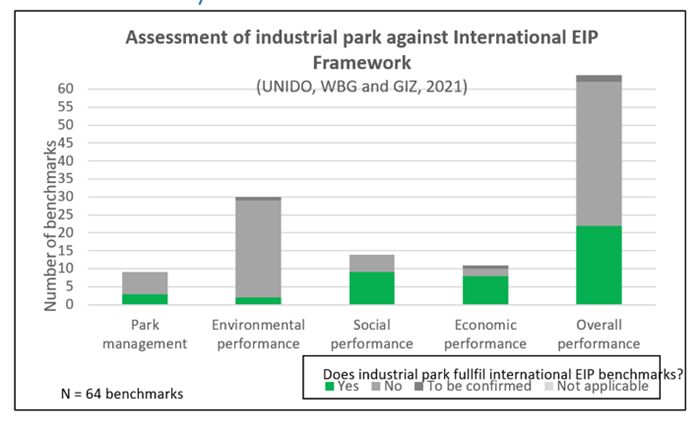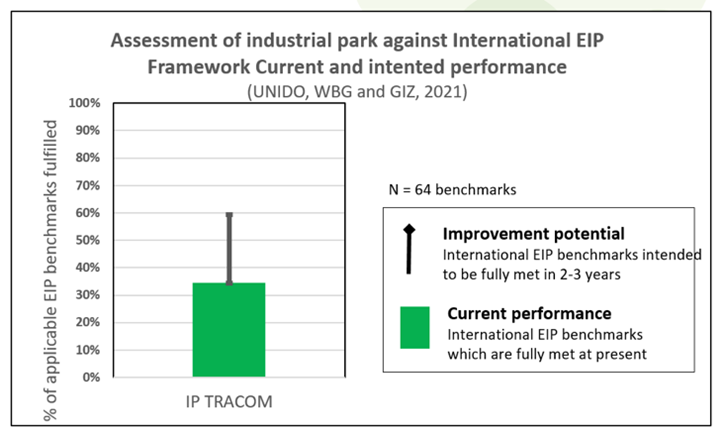The board of IP Tracom agreed that the ‘Development of IP Tracom as an Eco-Industrial Park’ is a key indicator and milestone to achieve by 2025. The management team of this zone has shown pro-active interest in addressing gaps in the EIP feasibility assessment and has taken active measures to improve their performance in the four key areas of assessment: park management, environment, social, and economic. The graph below demonstrates the IP’s performance at the end of their assessment as well as their ‘intended performance’ (i.e. improvement planned over the next 2-5 years with a series of short, medium and long-term plans):


Some of the key areas of improvement (high priority actions) identified for IP Tracom are:
Park Management
Monitoring and risk management
- Creating a legal register outlining the main laws related to Industrial Parks (including what an IP must do) and residents (focusing on their duties and IP responsibilities) to develop a short communication policy
Park management (performance Indicator)
- Amending contracts with tenants to ensure tenants are made responsible and liable for legal obligations such as waste, water, energy use, etc. The IP administration should also create a “Park – Code of Conduct” to supplement the contract. This could be a medium-term plan (not cause huge changes for the tenants who have been facing the negative impacts of pandemic and war)
Environment
Management and monitoring (updated records on energy, water, waste products, materials inefficiencies, and needs at tenant firms)
- IP administration to record the energy (per unit e.g., tonne of product or number of employees) tied with other environmental data such as waste (type and volume per company to check on industrial synergy), water use and discharge (as well as quality). The local companies in the Digital Hub could support too (e.g., in remote monitoring of energy, creating tools to monitor and measure waste)
Waste and material use (waste and hazardous waste)
- Ensure sufficient and suitable clauses in agreements (between the IP and tenants) on waste management (including hazardous waste). If agreements cannot be modified, clauses should be included in the ‘code of conduct’. As well, it is important to ensure that sub-tenants have equal liability and responsibility on waste management.
Energy (monitoring firm-level energy consumption)
- The energy used by individual tenants/firms should be monitored corresponding to consumption or production (e.g., turnover, production volume, employees, etc.) This would allow the IP and companies understand their energy use against a baseline.
Water supply and wastewater (industrial wastewater generated is treated in accordance with appropriate environmental standards)
- Water discharge to be strictly monitored and companies that exceed national legal norms to comply by ZLD, CETP, WWTP. The IP should also consider investing in a secondary or tertiary WWTP that can support reuse on site.
Social
Social infrastructure (surveyed employees can report satisfaction with social infrastructure)
- Develop a satisfaction survey that can be used as a template by all tenants
Back to the article EU4Environment advances Moldova’s sustainability agenda through Eco-Industrial Parks (EIPs).





